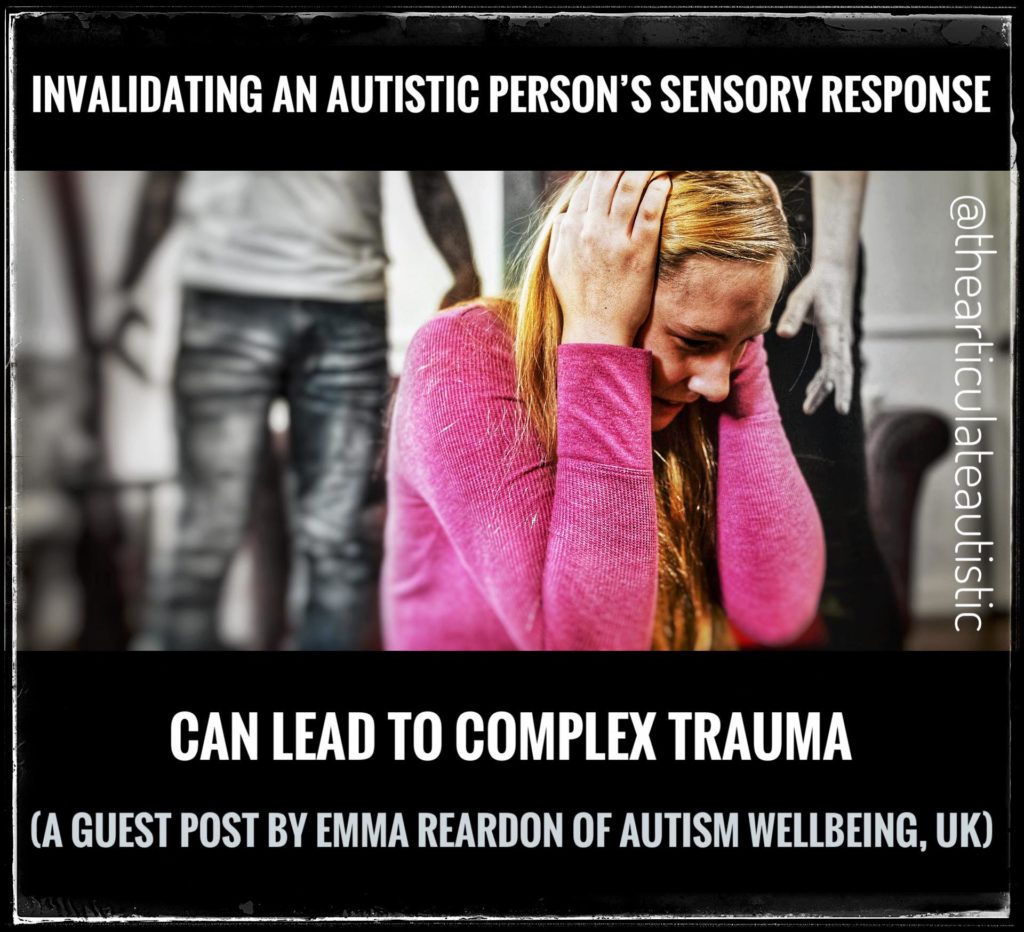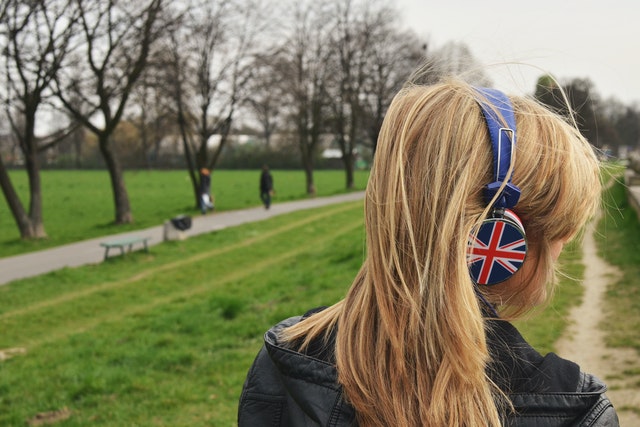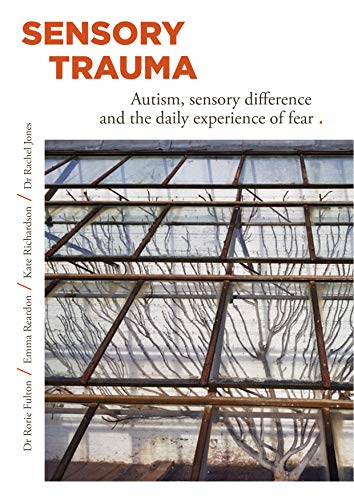Invalidating an Autistic Person’s Sensory Response Can Lead to Complex Trauma – A Guest Post by Emma Reardon of Autism Wellbeing, UK

“Sensory Trauma – Brilliant. People need to know about that!”
This was a phrase heard many times at each of the three UK autism shows we presented last month.
Many of our visitors – and in particular Autistic people and those most in tune with us – confirmed Autism Wellbeing’s contention that Sensory Trauma is indeed ‘hidden in plain sight’.
To quote directly from our book, “Autistic people use their bodies, sounds and words to declare that their sensory experience is different to that of non-autistic people.”
This is nothing new, and we have been showing and telling the world for as long as we have lived in it, that our sensory experiences are different – and sometimes even painful or distressing.
Background
In 2020, Autism Wellbeing set out to provide insights and explanations for this phenomenon that is part of our lived experience for many Autistic people. We wanted to better describe Autistic people’s sensory experiences and shift away from the pathologising language so often used by autism professionals.
Our interest wasn’t to explicitly contrast a medical model of disability against a social model but, rather, to create a space in which autistic sensory experience might be pondered free from any normative tilt or filter – that is, where it can be understood as difference rather than deficit.
I have been asked more than once if the word ‘trauma’ is too strong a word to use, and perhaps we were jumping on the social media bandwagon of calling everything that was slightly upsetting, traumatic. Like many people, I would give a resounding NO to that sentiment and, in fact, invite consideration of a statement from our work that I draw upon time and time again in our lectures, talks, and presentations:
“When an Autistic person experiences Sensory Trauma, their response to these painful or distressing episodes is not due to an inability to cope or an over-reaction – their response is proportional to their experience.”
What is Sensory Trauma?
I have written and spoken about Sensory Trauma in other spaces and places including radio shows and international blogs that draw upon my personal and professional experience, and at conferences including The Autism Show in the UK, Autscape (a fantastic Autistic conference), and the Autism Society of America.
My aim in this guest blog is to provide something that adds to the publicly available recordings and writings we have already produced and give a personal insight into the impact and effects of Sensory Trauma in my own life.
We, at Autism Wellbeing CIC, have characterised Sensory Trauma in the following ways, and I will share how my experience of the fifth core characteristic of Sensory Trauma has had some devastating effects on my life:
- The events experienced by Autistic people as painful, distressing, or life-threatening may not necessarily be the extreme events typically associated with trauma. Sensory Trauma may arise from ordinary, everyday events, interactions, and activities such as taking a shower, attending a meeting at work, or going to the supermarket.
- All of us live in unpredictable and ever-changing environments. For Autistic people, the potential for Sensory Trauma may be there all the time. This may mean that the Autistic person you are alongside does not feel safe in their everyday environments, whether at school, at work, or in a care setting. They may be constantly alert and scanning their environment for potential threat. Being physiologically activated in this way for sustained periods can affect the person’s mental and physical health in both the short and long term.
- Autistic people often spend their time in the company of other people and in busy environments. This means there may be frequent occasions for them to experience Sensory Trauma, for example, whilst moving around a busy school environment, working in an office under fluorescent lighting, or dealing with the smell of traffic fumes in town.
- The frequency and ordinariness of events that may give rise to Sensory Trauma mean that such events might occur at any time and in any place over the course of the day. In this way, the day-to-day lives of Autistic people are permeated by the expectation, anticipation, experience, and effects of Sensory Trauma.
- An event that causes an Autistic person to experience Sensory Trauma may be construed as harmless or inconsequential by non-autistic people in the same environment, assuming, that is, they were aware of the event having occurred at all.
Personal Experience

Growing up, I was a bundle of contradictions! I appeared to have hearing loss as I didn’t respond to my name being called, yet, paradoxically, I could hear a person breathing in the next room and cried because my ears hurt at certain noises like the machines in the metalwork classroom at school. In fact, the pain I experienced in those school workshops was so severe that I was allowed to sit out of metalwork and woodwork – and in those long-ago days when I was at school, it must have been bad! Or, I’d not be able to find something that was right in front of my eyes, but could spot if a teacher made a spelling mistake while chalking up the lesson plan on the blackboard – and I’d have no reservations in enthusiastically and helpfully pointing that spelling mistake out!
- Physical Health
It was obvious that I experienced the world differently, and I underwent various medical investigations for physical health conditions that could be the cause of my unexpected (but totally proportionate) responses to the world. Five operations to cure my “deafness” by age 18. Surgical investigations on my bowel and bladder because I wouldn’t notice I needed to use the toilet until the last moment. Orthopaedic consultant appointments about my “loose ligaments” and surgery for my repeated knee dislocation and consequent arthritis.
When I reflect on these medical interventions, I can better explain my situation through a lens of sensory processing. Whilst I may have had some earache due to physical causes, I also experienced intense auditory pain due to the way my brain processed auditory input.
My interoceptive sensory system tends to experience body sensations like pain, emotions, and needing the toilet, in very muted ways. I need a lot of interoceptive input to register the sensation, hence not noticing I need the toilet until the last moment when I really need to go.
The medical interventions suggested vague explanations like “a sluggish bowel”, but that didn’t really explain what was happening to me and suggested that perhaps there wasn’t really anything that seriously wrong.
This made me feel that perhaps I was over-reacting, too sensitive, or making it up.
I have always struggled to explain my physical health symptoms and have written about this in a blog called Saying “ouch!” in all the wrong places … – Undercover Autism
These experiences, associated with my physical health, demonstrate not only how other people may not be aware of the events causing me Sensory Trauma (the noise from the metalwork class for instance), but they may not believe them or may mislabel them, too.
These contradictions I touched upon have been the soundtrack of my life as an Autistic person.
I can be fantastic at things other people typically find difficult yet struggle with things other people do with ease.
At times, this has resulted in me being a welcome part of a group – at work, I frequently contribute novel ideas or a different perspective. But this quality of mine – and many other Autistic people – frequently resulted in me being the odd one out, different or “other”, especially when I was growing up and trying to find my place in the world.
Mental Health

I was referred to mental health services, and l also approached services for help over a 30-year period. I presented as depressed and anxious, and I discussed my tendency to hear things that other people didn’t hear and feel sensations that others told me weren’t really happening. To cut a long story short, I was prescribed antipsychotic medicines that, over time, were increased in dose up to the maximum amount.
I was told I would need to take them forever as it was likely I would never cope with the stresses and strains of daily life without being medicated.
I cannot comment on how I was perceived by clinicians in my decades of psychiatric (mis)treatment, but I imagine the fact that I was female, articulate, intelligent, and successfully masking, contributed to autism never being considered.
My experience as a professional shows me time and time again that psychiatric diagnosis is gendered. Research into previous diagnoses of adults diagnosed with autism in adulthood revealed that girls were diagnosed with personality disorders, gender identity disorders, eating disorders, and anxiety at far higher rates than boys. Boys were diagnosed with ADHD, conduct disorders, and learning disabilities more often.
Throughout my life, I have appeared to “over-react” to situations – only people don’t typically recognise that it is sensory input or a build-up of sensory input that I am responding to. During my decades under psychiatric services, I’d sometimes need to leave a supermarket with the directness of a guided missile. Eyes locked on the exit, consumed by the tunnel vision naturally experienced in a survival response of “flight”.
Accidentally bumping into or brushing past people and not having the capacity to engage with them socially in my urgency to escape. This reaction of mine appeared to “come out of nowhere” to the regular supermarket goers who delighted in the opportunity to browse the colourful displays, who could groove away to or block out the background music according to their taste, and who found the smell of aftershave and perfume alluring.

Those bystanders were not aware of how my brain processes sensory input. How the brightly-lit packaging on the shelves feels like a strobe light attacking my eyes. How some noise physically hurts. How smells can be thought-stoppingly nauseating. I’d enter the stores only when I had to. I’d put my hood up or wear headphones. I’d become quiet and only able to respond in monosyllables. I’d try and cover my face.
I’d walk directly to what I wished to buy and almost collapse with distress if the item had been moved or was sold out, such was the energy I was putting into just being there.
I would not recognise people who were familiar elsewhere so could quite likely appear rude or as if I was ignoring them. I’d instantly shift from being a warm, engaging, and articulate adult into a shifty, paranoid-looking, unintelligible, and terrified mess as I entered the store.
And then back again to my comfortable self, afterwards. This no doubt added to the idea I was experiencing psychosis based on how I conducted myself in the shop, yet also appeared to demonstrate an emotional instability where I was “up and down” for no apparent reason.
Trigger Warning – Mention of S*icide
Trauma

So, there I was, female and in all likelihood perceived as being more susceptible to certain psychiatric conditions on account of my sex. Like many Autistic people, I have experienced trauma. It is recognised that Autistic people are four times as likely to experience bullying, more likely to experience ACEs (adverse childhood experiences), and much more likely to experience self-harm or die by suicide.
Autism and trauma often go hand in hand. It did not take long for the question of whether I had traits of one or two personality disorders to appear. Bearing in mind that at this time I was managing registered residential services for people who had severe and enduring mental illnesses, I became terrified that I was some sort of evil monster, so lacking in self-awareness that I couldn’t see how unstable and mentally ill I was. Perhaps I was so unsafe to look after people that I should quit? My employers were fully supportive and did not concur with the suggestion of personality disorder.
It also appeared that my “psychosis” was under control. Like me, they believed that personality disorder is an unhelpful label used to describe people who are usually doing their best to cope with the horrendous trauma and experiences they have had.
The personality disorder label is stigmatising even within mental health circles, and patients with this diagnosis may be perceived as deliberately manipulative or difficult.
But it is difficult not to internalise those unfounded prejudices so widely shared in society and a process of what I can only describe as gaslighting took place. Psychiatric services told me I was mentally ill, I didn’t agree, therefore my disagreement must be a further symptom of just how ill I was!
My already shattered self-esteem was pretty much destroyed for good.
Of course, I most likely was experiencing some degree of mental ill-health, indeed Autistic people are more likely than their non-autistic peers to experience mental illness. Personally, I don’t feel that reduced wellbeing should be inevitable for Autistic people. If Autistic people were better treated and understood, I imagine we would find that the anxiety that is so often reported, diminishes somewhat. The trauma resulting from bullying will be reduced – not because we cope better, but because it becomes unacceptable to bully us.
This mixture of physical and mental health diagnoses joined the other mislabelling I received throughout my life. I was seen as lacking concentration in class at school – yet I was always concentrating on one of the many things my classmates and teacher probably hadn’t even noticed.
The painful screech of a chair against the hard floor at the back of the class. The echoing boom of the ticking clock. The smell of school dinners plus Impulse body spray (very popular in the UK in the 1980s) plus the Polo mints the teacher thought he’d suck to disguise the cigarette smoke on his breath (don’t think you got away with that one) plus body odour plus the competing food smells from the home economics kitchen, plus, plus, plus….. There is frequently too much to focus on, and my brain finds all of it equally important!
I was seen as weird because I talked about my interests that were not shared with peers. I moved differently, spoke differently, thought differently.
Almost every time I shared the things that were important and significant to me that were not shared by my peers, my experiences were invalidated. I was told I was NOT concentrating and should look like I was. I was told I WAS mentally ill because no one else can hear people talking about me next door. I was told I was NOT in pain when the door slammed, I was simply over-reacting.
As a result, I lost trust in my own judgment. I already had very little trust in anyone else’s judgment as none of them seemed to be picking up the same sensory information and experiences from our shared surroundings. My already-struggling sense of identity diminished. I have a body that experiences some sensations intensely and some sensations hardly at all.
My proprioception or sense of where my limbs are is so muted that I need to move about in order to feel like I am actually inhabiting my own body. I could describe it as like having blurred edges. I need huge amounts of input to register that I am feeling emotions, and by the time those emotions are big enough for my brain to notice, they may be unbearable to sit with. My eight-sense systems process the world very differently to other people’s, and just like everyone else – we all have a sensory processing system – my sensory processing system is dynamic. We all have good days and bad days.
Invalidation

My story is one of misdiagnosis, mislabelling at school, and internalising those horrible messages almost everyone else was giving me about what I was like or not like. The toll on my wellbeing from the mislabelling has been more destructive than the mental illnesses I believe I have genuinely experienced.
From research on people who have experienced abuse, we know about the effects of living in environments where a person’s experience is invalidated. I am Autistic, and I have experienced abuse.
I can honestly say from my personal experience that the invalidation of my sensory and other Autistic experiences is as significant as the gaslighting I have experienced in ongoing abusive relationships.
The negative effect on both my self-esteem and my sense of self was immense.
The mistreatment I experienced and the bullying for being weird or different was somehow reinforced every time my sensory experiences were not shared and therefore not believed by others – proof that I was different. Sometimes the effects of mislabelling can result in health-harming behaviours, imprisonment, or detention under the mental health act.
For me, I paid an additional physical price. Metabolic syndrome and its effects on blood sugar and cholesterol levels can be affected by antipsychotic use, and I put on several stones in weight and have permanent scarring around my eyes from my high cholesterol.
Who knows how my immune system and metabolic system have been impacted long-term?
It was only when I realised I was Autistic and not psychotic with a personality disorder that I was able to implement self-care that suited my Autistic way of experiencing the world. I was able to become a healthy Autistic person and then manage any physical and mental ill-health in a way that played to my strengths and had proactive emotional and sensory self-regulation at its heart.
Of course, I am different. And that’s OK. Reflecting back on the fifth characteristic, as we see it, of Sensory Trauma:
“An event that causes an Autistic person to experience Sensory Trauma may be construed as harmless or inconsequential by non-autistic people in the same environment, assuming, that is, they were aware of the event having occurred at all.”
We all experience the world through our senses. We each have a unique sensory profile – those sensations we like or dislike, seek out or avoid. Most people have sensory experiences that are at times intense and elicit an automatic response, for example:
Think of taking a swig of sour, gone-off milk when you think it will be cold, creamy, and delicious. Your brain responds and your body pulls away, retches, spits the milk out, and maybe even throws the milk container down on the floor in order to get you away from this source of threat as quickly as possible. A completely proportionate response.

As an Autistic person, my brain is perceiving threat in places where perhaps the majority of people don’t perceive threat.
Our book, Sensory Trauma: Autism, sensory difference and the daily experience of fear, describes some of the mechanisms that we believe are behind this in more depth. We also challenge the way people use language in our book because, as I know from my own experiences described in this blog, language is powerful. Words can do harm. The way we perceive Autistic people can be more difficult to deal with than the natural differences experienced by being Autistic.
Validation
My colleagues at Autism Wellbeing CIC are passionate about validating people’s experiences in the interactions we have with others. We, in turn, have felt validated by the positive responses we have received for our work on Sensory Trauma.
As I started off by saying, Sensory Trauma is nothing new, it is hidden in plain sight.
We need to listen to and believe Autistic people when they share their experiences and recognise not only the damage that occurs when we don’t but the huge loss of potential the world experiences because Autistic people are being misunderstood by those who don’t share their experiences.


Omg, this could have been me writing this!! The last 2 days I spent Christmas has made me so ill today. I have eds and fibromyalgia.
Doing this has made me too ill and I have to mask on Christmas day as I am going to my boyfriends brothers. Still haven’t wrapped presents. I spent over 2hrs in one shop where I started to shake and my eyes couldn’t focus. I was hot and felt I was going to faint.when I got to the checkout I discovered I didn’t have my phone which has a wallet with my cards in 😪 Luckily it was in the car but this was a horrendous experience for me and my boyfriend could believe the state I had got .myself in. The other day I had left my phone in a supermarket and same thing, went to checkout and couldn’t pay luckily a customer had seen it and handed it in. I really feel now that I can no longer shop by myself.
I’m sorry you’re having such a rough time. 🙁 The holidays can be especially difficult for us autistic folks, eh?
Thanks for informative and validating article. I was wondering if you have information on the narrowing of the window of tolerance in response to sensory trauma? I’m trying to understand how I use to tolerate all sorts of sensory issues that were just uncomfortable at the time but now are intolerable and cause me to flee or meltdown. And if it’s possible as an autistic person to widen my window of tolerance again.
I’ve noticed as I’ve gotten older my tolerance for too much sensory input bothers me even more. It’s unfortunate, but I haven’t found a way to stop it or widen my tolerance. However, I have learned to accommodate myself so that I feel less agitated.